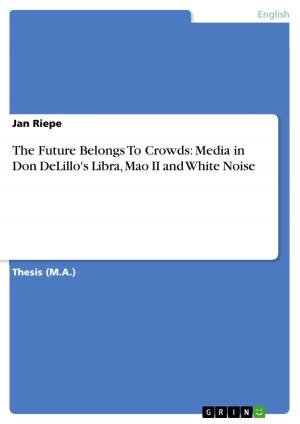Minority Incorporation in City Politics & Government
Nonfiction, Social & Cultural Studies, Political Science| Author: | Renard Teipelke | ISBN: | 9783640547920 |
| Publisher: | GRIN Publishing | Publication: | February 24, 2010 |
| Imprint: | GRIN Publishing | Language: | English |
| Author: | Renard Teipelke |
| ISBN: | 9783640547920 |
| Publisher: | GRIN Publishing |
| Publication: | February 24, 2010 |
| Imprint: | GRIN Publishing |
| Language: | English |
Essay from the year 2009 in the subject Politics - International Politics - Region: USA, grade: 1,0, University of California, San Diego (Department of Political Science), course: Urban Politics, language: English, abstract: In the following report I will present the main points of the minority incorporation hypothesis in Browning et al.'s book 'Racial Politics in American Cities.' I will show that San Diego's first Latino mayor can only succeed in satisfying the demands of a city transitioning toward majority-minority status if he is able to implement policies that enable minority incorporation in quantitative and qualitative terms, thereby working with an issue-oriented coalition on an agenda that balances social and economic interests. After outlining the requirements for successful minority incorporation, the expectations of representative and policy responses from the takeover of the city government by people of color will be described. Then I will explain the (dis-) advantages of multi-racial/ multi-ethnic alliances and ways to solve the possible dilemma between intra-ethnic solidarity of Latinos and interests of the inter-ethnic rainbow coalition. This is followed by a discussion on how different interests of the city's disparate constituencies can be overcome and how a backlash among the Anglos can be avoided. At the end, the concept of the 'hollow prize' mayor will be applied on this specific case.
Essay from the year 2009 in the subject Politics - International Politics - Region: USA, grade: 1,0, University of California, San Diego (Department of Political Science), course: Urban Politics, language: English, abstract: In the following report I will present the main points of the minority incorporation hypothesis in Browning et al.'s book 'Racial Politics in American Cities.' I will show that San Diego's first Latino mayor can only succeed in satisfying the demands of a city transitioning toward majority-minority status if he is able to implement policies that enable minority incorporation in quantitative and qualitative terms, thereby working with an issue-oriented coalition on an agenda that balances social and economic interests. After outlining the requirements for successful minority incorporation, the expectations of representative and policy responses from the takeover of the city government by people of color will be described. Then I will explain the (dis-) advantages of multi-racial/ multi-ethnic alliances and ways to solve the possible dilemma between intra-ethnic solidarity of Latinos and interests of the inter-ethnic rainbow coalition. This is followed by a discussion on how different interests of the city's disparate constituencies can be overcome and how a backlash among the Anglos can be avoided. At the end, the concept of the 'hollow prize' mayor will be applied on this specific case.















